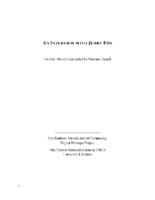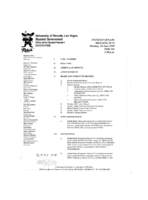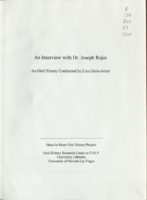Search the Special Collections and Archives Portal
Search Results

Transcript of interview with Gertrude Rudiak by Claytee White, January 11, 2007
Date
Archival Collection
Description
Gertrude (n?e Rightman) Rudiak was born in 1915 in North Dakota to Russian immigrants. She grew up in Wisconsin until 1924. That was the year the family drove to California via the Yellowstone Trail, a dusty, undeveloped road marked by yellow stones. In Los Angeles, her father practiced chiropractic, a holistic approach to well-being for which there was little knowledge at the time. Gertrude earned her music degree at University of California at Berkeley; a decision that did not lead to a career. She then attended a business college and got a job as a social worker in Northern California. In 1941, she met and soon married George Rudiak. It was the advent of World War II. George enlisted in the service and was assigned to Las Vegas Gunnery School (Nellis Air Force Base.) Since he had a law degree from University of California at Berkeley and passed the Nevada Bar exam, he found supplemental employment with local attorneys. Las Vegas became the Rudiaks? permanent home where they raised their five children. In this interview Gertrude recalls the stories of coming to live in Las Vegas of the 1940?s: their phone number was 1-2-3; the neighborhood they lived in longest being Scotch 80s and being part of the secular and Jewish communities.
Text

Transcript of interview with Mike and Susan Baller by Barbara Tabach, March 16, 2016
Date
Archival Collection
Description
In this interview, Mike and Susan Baller reflect upon their lives in Las Vegas, from growing up as teenagers amongst the tight-knit Jewish community, to mob influence on the city, and the impact of the city's growth. Mike shares stories about first arriving in Las Vegas to live, being a teenaged busboy at Binions Horseshoe to being related to Moe Dalitz -- in Michigan Mike drove a truck for the Dalitz dry cleaning business.
Text

Transcript of interview with Jerry Fox by Barbara Tabach, November 12, 2014
Date
Archival Collection
Description
Interview with Jerry Fox by Barbara Tabach on November 12, 2014. In this interview, Fox discusses his father's restaurant, Foxy's Delicatessen, which opened on the Las Vegas Strip in the 1950s, and his own business endeavors including the Tinder Box and an embroidery business.
Jerry Fox grew up in Los Angeles until his family moved to Las Vegas in February 1955, where his father opened Foxy's Delicatessen, the city's first Jewish deli. Jerry would go on to follow in his father's entrepreneurial footsteps, operating several ventures across different industries, including his own restaurant, Foxy Dog. Jerry sold Foxy Dog in 1975 after going through a divorce, the same year that Foxy's Deli closed.
Text

Transcript of interview with Joseph Gemma by Dan Murphy, March 1, 1979
Date
Archival Collection
Description
On March 1st, 1979, collector Dan Murphy interviewed Anderson Dairy production manager, Joseph Gemma (born on October 25th, 1934 in Norwalk, Connecticut) in his home in Las Vegas, Nevada. This interview covers the history of Las Vegas, including employment opportunities, construction work, housing developments, and the hotels on the Strip. Joseph also recalls social and environmental changes and local recreation, including sports and the importance of gaming in Nevada.
Text

Lisa Hank oral history interview: transcript
Date
Archival Collection
Description
Oral history interview with Lisa Hank conducted by Barbara Tabach on May 31, 2019 for the Remembering 1 October Oral History Project.
Lisa discusses her move to Las Vegas in the early 1990s from California for a job with the Las Vegas Metropolitan Police Department, and her current position as head of the Police Employee Assistance Program (PEAP). Lisa talks about the night of October 1 and the aftermath of the shooting, both in her work and personal life. She is the wife of Charles Hank III, police officer and another interviewee for the Remembering 1 October Oral History Project.
Subjects discussed include: well-being in aftermath of 1 October; PEAP preparation; healing.
Text

Meeting minutes for Consolidated Student Senate University of Nevada, Las Vegas, June 28, 1999
Date
Archival Collection
Description
Text

Transcript of interview with Barbara Agonia by Suzanne Becker, September 17, 2007, September 25, 2010, & October 2, 2007
Date
Archival Collection
Description
When Barbara Agonia arrived in Las Vegas in 1969 to pursue a Master's Degree in English, the University of Nevada Las Vegas was barely ten years old and the population of Las Vegas was just approaching 160,000 residents. At the time, she was 35 years-old and it was a decision and move that would forever change her life and higher education in Clark County. Barbara Agonia was born in St. Louis, Missouri, in 1934 to Robert Lewis Klinefelter and Suzanne Carter Klinefelter. At the time of Barbara's birth, her father worked for Brown Shoe Company in St. Louis. The family moved to Bunker Hill, Illinois when Barbara was still an infant. This was Mr. Klinefelter's hometown where a portion of the extended family still resided. In the late 1930s, Mr. Klinefelter got a job in a brass mill near Alton, Illinois, and he commuted there daily. When the United States entered World War II, Mr. Klinefelter tried to enlist in the army, but was rejected because he had two small children and because he worked in an essential industry. He decided to work in a non-essential industry and took a job at Montgomery Ward in Oak Park, Illinois. Barbara was in the third grade that year. Still unable to enlist, Mr. Klinefelter moved the family to Wabash, Indiana, and began working for General Tire in 1943. They moved to Logansport, Indiana in 1947. Agonia recounts that education has always been a significant part of her life, with the importance of a good education stressed in her life from early childhood forward. After graduating from high school in Logansport, Indiana, she attended Hanover College in southern Indiana, enrolling in 1952. Her educational experience at Hanover included a year studying abroad at the University of Exeter in Devonshire, England—an experience which Agonia credits as further cementing her commitment to education and her love of literature and language. She graduated from Hanover in 1957 with a double major in English and speech/ theater. Agonia spent her first years out of college teaching high school English, speech, and theater in west central Illinois and the next eight in northern Illinois. A little over ten years into her career, at the age of 35, she decided to pursue a Master's degree in English. Her sister, Martha, who at the time lived in Las Vegas, suggested checking into programs offered at the city's newly formed university. In 1969, Barbara moved to Las Vegas and enrolled in the English Department at UNLV. As Agonia was completing her degree in 1971, the community college system in Nevada was emerging and seeking faculty for the up and coming institution. Curious to know more about the new system, Agonia scheduled a meeting with the person in charge of hiring. Two hours later, she walked out with a contract in her hand, one of eight new faculty members at Clark County Community College, now known as College of Southern Nevada. In her early years with the college, Agonia did a great deal of public speaking on behalf on the newly formed system, promoting the new institution and reaching out to potential students. At the same time, she taught full course loads in composition and literature, and eventually became chair of the English department. Her new position and public speaking work on behalf of the college not only provided her contact with the local Las Vegas community, it ultimately became the catalyst in spurring her passion for community involvement, particularly working on behalf of women within the community. • • Vll As the 1980s approached, Agonia became actively involved in rape crisis education, at the urging of Florence McClure. Then, in 1980, Agonia was again in on the ground floor of community programming, when she and Beverly Funk, at the urging of Judith Eaton, the president of Clark County Community College, established a Women's Center on campus. The Center was initially set up to help women in a variety of life circumstances, including women who were wanting to return to school or who were new to the process of school altogether. The center eventually became the Re-Entry Center offering skill development, tutoring programs, and other forms of assistance for anyone interested in returning to school. In addition to her involvement in and commitment to public education, Agonia has also been involved in the Soroptimist International organization for business and professional women who work to improve the lives of women and girls in local and international communities. In the Las Vegas area, Soroptimist International of Greater Las Vegas worked to establish the Rape Crisis Center and the Center for Domestic Violence, which later became SafeNest. Agonia has been working with the organization since 1982. Through Soroptimist International, she also became involved in Friends of the Nevada Wilderness, an organization devoted to designation and long-term protection of Nevada's wilderness areas. As the representative for Soroptimist International, she traveled to Washington to lobby and testify in front of the senate for the establishment of Great Basin National Park. Agonia's work in the Las Vegas community over the past forty years has been significant. She counts Florence McClure, Geneva Douglas, and Jean Ford amongst her greatest influences. As she notes in her oral history, "I learned how to be radical from those women." She happily embraces the label of radical. This attitude surfaces throughout Agonia's experiences and recollections, and underscores her work and dedication to the interplay of local education and women's issues within Nevada.
Text

Transcript of interview with Dr. Joseph Rojas by Lisa Gioia-Acres, September 30, 2008
Date
Archival Collection
Description
Dr. Joseph Rojas, born 1933 in Alexandria, Louisiana, was the son of Joseph Edward Rojas and wife Carroll. He graduated high school at age 16 and entered Loyola University of the South. Two years later he was accepted at Louisiana State University School of Medicine, graduating with a medical degree in 1957. He interned at Charity Hospital and then completed his OB-GYN residency at Tulane University. Several mentors worked with Dr. Rojas during his residency and he recalls learning surgical and bed-side skills from the likes of Dr. Lynn White and Dr. Fred Janson. He also remembers the very high volume of patients - up to 300 - that he and other residents saw daily. Dr. Rojas married Mona Robicheaux, RN, during his residency and afterwards joined the Air Force. He and his family — they eventually had six children — were stationed at Nellis Air Force Base, arriving in Las Vegas in 1961. He was chief of OBGYN and deputy hospital commander while at Nellis and then served as chief of OBGYN at Southern Nevada Memorial Hospital until 1972. He later served as chief of staff at Women's Hospital and Valley Hospital, and was the first chief of staff at Summerlin Hospital. Dr. Rojas also maintained a private practice outside of the hospital. His wife worked alongside him in his office, and they share memories and anecdotes of the patients they saw and the general atmosphere of the medical community. Both Joseph and Mona agree that Las Vegas hospitals were less racially segregated than the hospitals in Louisiana, and felt that the West was more open to integration. In 1966 Dr. Rojas started the first OB-GYN residency in Nevada, which led to the development of the University of Nevada School of Medicine. He was a researcher, lecturer, teacher, and author. He earned many awards, including the Harold Feikes MD Award for Outstanding Physician in Clark County (2001), and the Nevada State Medical Association Distinguished Physician Award (1980). Dr. Rojas passed away in May of 2009, leaving behind an incredible legacy of service to the residents of Clark County.
Text

Miguel Villarba oral history interview: transcript
Date
Archival Collection
Description
Oral history interview with Miguel Villarba conducted by David Islas on December 6, 2021 for Reflections: The Las Vegas Asian American and Pacific Islander Oral History Project. In this interview, Miguel Villarba shares his family's history growing up in Manila, Philippines and immigrating to the United States in 2016. He talks about first living in Chattanooga, Tennessee before moving to Las Vegas, Nevada to be near family when Miguel was in high school. Miguel Villarba shares stories of his grandfather's farm in Pangasinan, Philippines, the differences in city and town life across Manila, Chattanooga, and Las Vegas, and his educational plans. He also talks about Filipino culture and traditions, and racial discrimination.
Text

